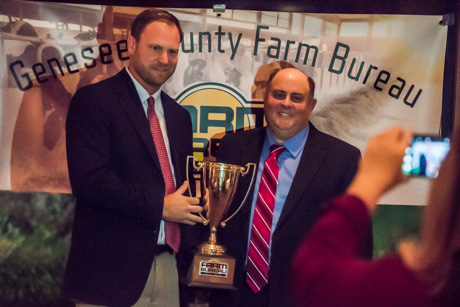If State Senate flips party leadership, it could lead to hardships for rural residents, local farmers warned

Local farmers were warned Tuesday night at the Genesee County Farm Bureau's annual meeting at Terry Hills that there's a risk Republicans could lose control of the State Senate, which would be bad for Upstate rural residents speakers warned.
Dean Norton, director of public policy for the New York Corn and Soybean Growers Association, said if Democrats gain control of the Senate, to go along with their control of the governor's seat and the Assembly, things could get as bad or worse as 2009-2010, the last time the Democrats controlled both the executive and legislative branches of state government.
Norton was president of the New York Farm Bureau then.
During that era, the state redirected 30 percent of school funding to downstate schools, eliminated $60 million in local agency funding, which meant cuts to ag research, gutted the Environmental Protection Fund for Upstate; and if not for five rural Democrats who voted no, would have passed a farm labor bill that would have greatly increased the costs of farming in New York.
"You think a $15 an hour minimum wage is going to be hitting," Norton said. "It's going to be higher."
Regardless of what Gov. Andrew Cuomo says, Norton said, he is no friend of rural communities.
Chris Laughton, director of knowledge exchange for Farm Credit East (bottom picture), the night's keynote speaker, also expressed concern that New York will lose the benefit of a divided government.
"One could argue that there is value in having a divided government and one party can keep the other in check," Laughton said. "The State Senate is up for grabs and could shift parties pretty easily and that could bring urban lawmakers more to the forefront in policy discussions."
Most of Laughton's talk about was about national issues affecting farmers.
The mid-terms are coming up, he noted, and his prediction is that Republicans lose seats in the house but maintain a narrow majority.
The farm bill expired Sept. 30 and Congress has not passed a replacement. Funding for SNAP (food stamps) and crop insurance continues but many other USDA programs come to a halt for the time being.
A Senate version of the farm bill passed by the largest margin in many years but the House version barely got through and it is drastically different from the Senate version. The House version raises the work requirements for SNAP recipients, which is a big reason it has no Democratic support.
Trade remains a big issue for farmers.
Soon there will be tariffs on every import from China and China is retaliating, especially against agriculture.
Trade between the United States, Mexico, and Canada has more than tripled since 1995 when NAFTA was ratified. For U.S. farmers, it's meant an increase in exports in corn, dairy, and pork, with more fruit and vegetables being imported into the United States.
The new agreement, which hasn't been approved yet, doesn't change much, with a slight change coming for dairy.
Canada is eliminating its Class 6 and Class 7 pricing. The primary benefit is that Canada will no longer undercut the U.S. price on these classes of milk products in global markets.
Canada's supply management system remains in place. The United States had access to 1.5 percent of the Canadian market. That will increase to 3 percent.
“So our access to the market is still fairly limited but it is an increase," Laughton said. "It’s not a small market for us. We exported more than 600 pounds from four states into Canada last year and it could increase our exports by about 200 billion pounds at least."
"The effect on U.S. prices is still unclear," he said. "It's certainly not going to help us in the short term."
During a Q&A after his talk, in response to the overall health of the dairy market, Laughton said, "I think prices are going to get better and margins are going to get better, but it’s going to be a slow climb."
To offset agriculture losses from tariffs, the Federal government is delivering billions in subsidies. Much of that will be in the form of price supports but the Federal government is also going to purchase $1.2 billion in commodities for nutrition programs. There will also be $200 million spent to promote exports.
Top Photo: John Sobello, state board of directors, right, presents the New York Farm Bureau membership trophy to Christian Yunker, Genesee County Farm Bureau president, to recognize the local chapter's membership efforts in 2018. Criteria for the award include member retention and new member sign-ups.

